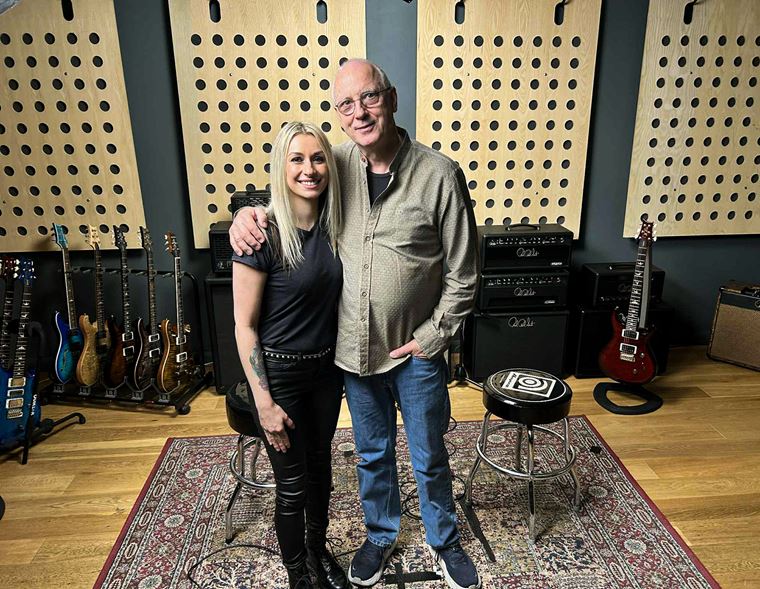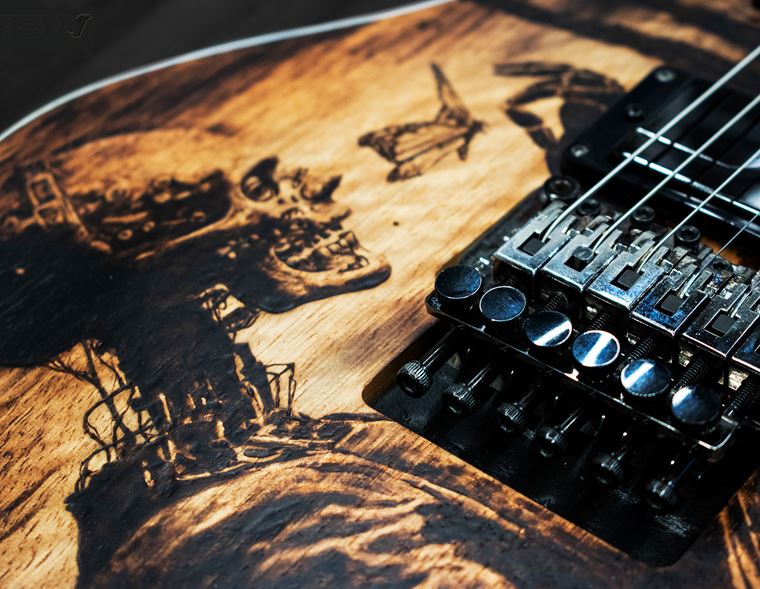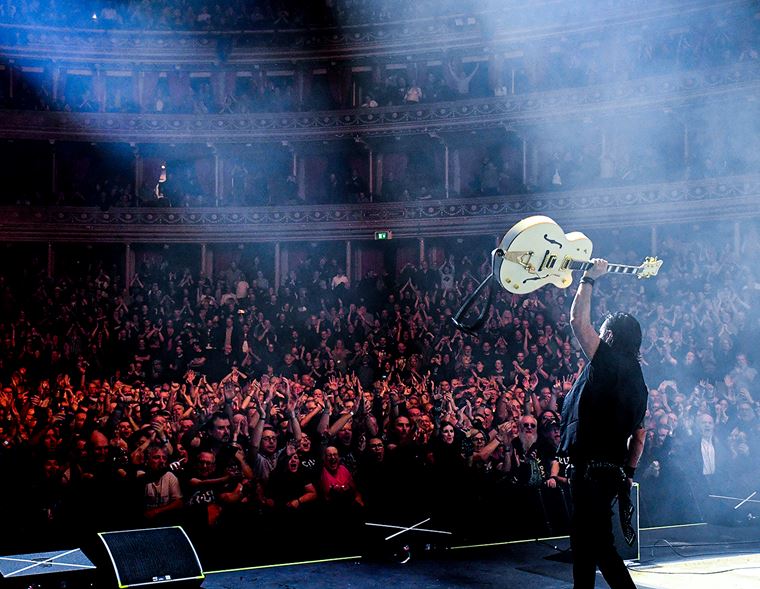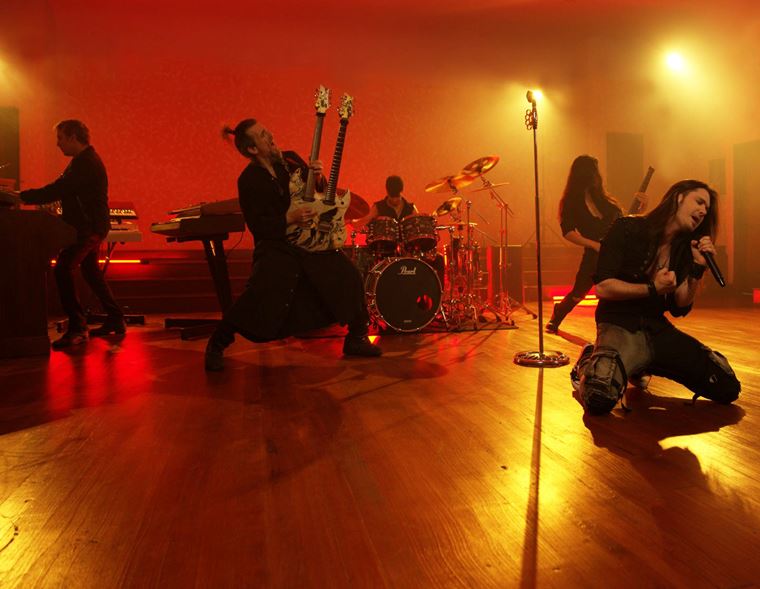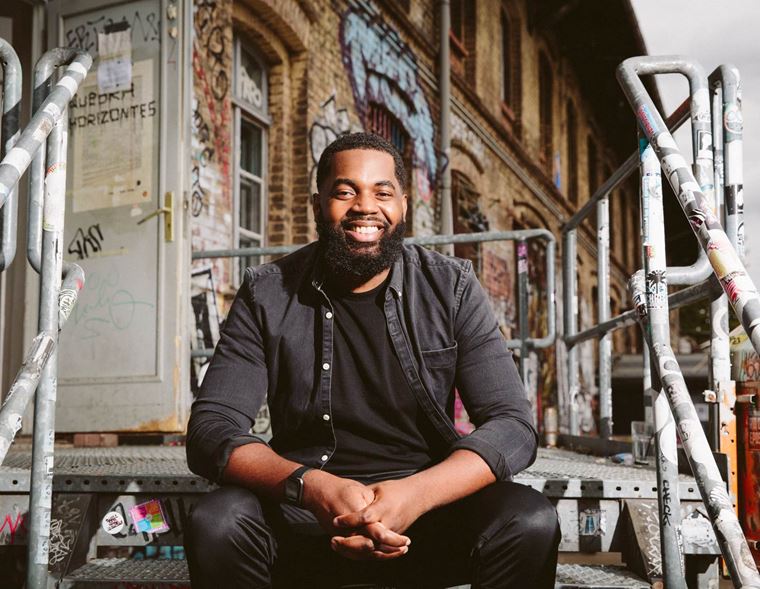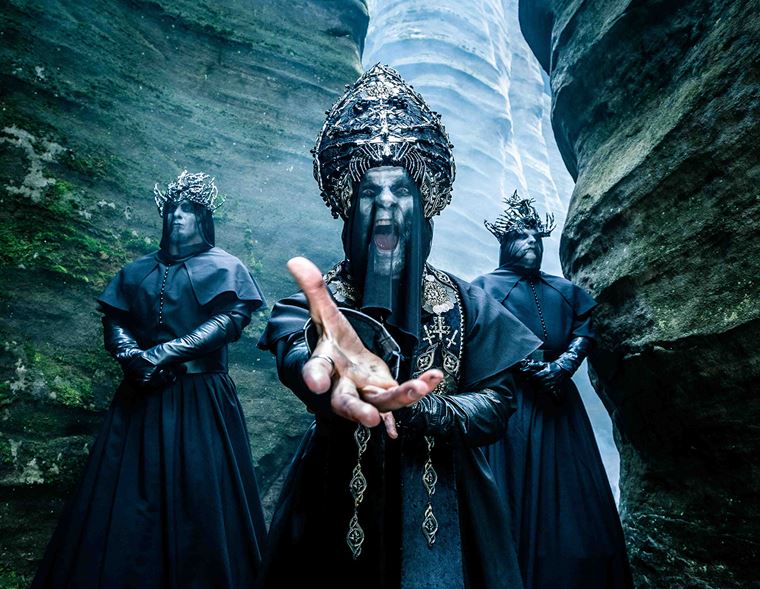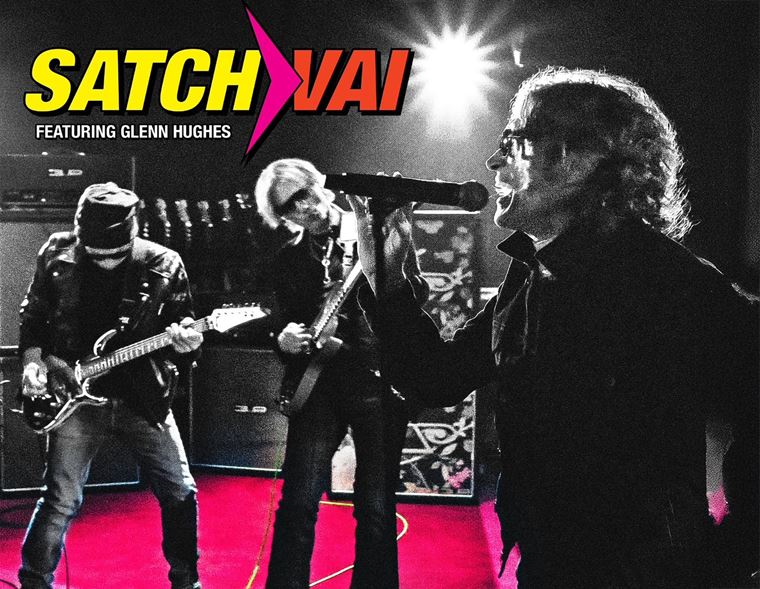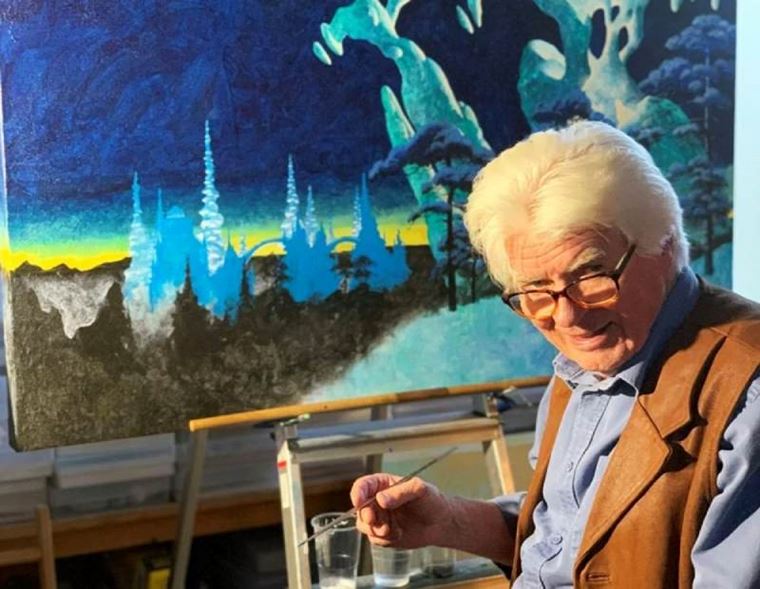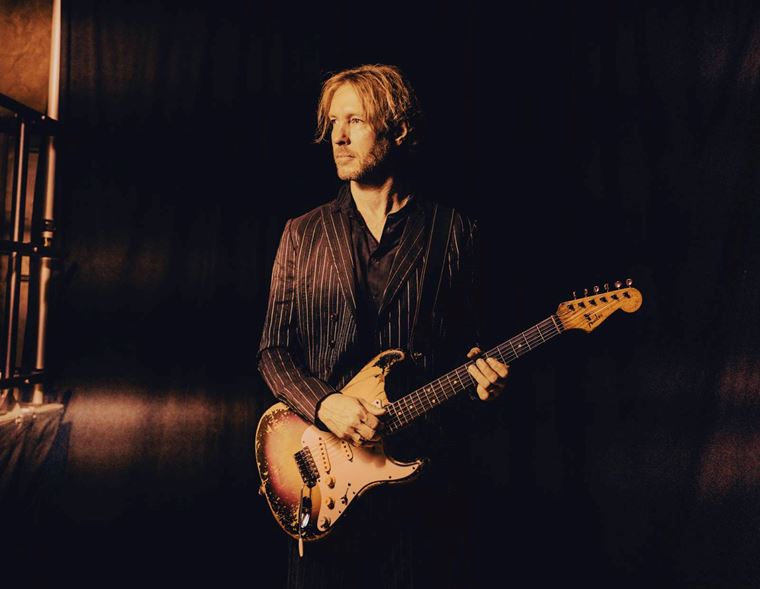Wovenhand Interview: Chuck French Talks Silver Sash and More!
There aren’t many bands out there quite like Wovenhand. Their sound is equal parts mystical, psychedelic and apocalyptic. It’s not heavy in the traditional sense at all, but man, it’s heavy!
The Denver quartet, led by singer/guitarist David Eugene Edwards (of 16 Horsepower fame) have spent the last 20 years taking a blueprint that’s part Nick Cave, part Joy Division, and stamping a full serving of Old Testament drama and colour to their recordings. It’s beautiful, bruised music that screams for redemption but knows such a thing isn’t necessarily forthcoming.
We’ve been Wovenhand fans for a while here at guitarguitar, and when the band released their newest record, Silver Sash, mere weeks ago, we knew we’d have to at least try for an interview! Lead guitarist and co-writer Chuck French gamefully agreed, and so we had a most entertaining conversation via Zoom. Chuck was great company: funny and happy to share details on Wovenhand’s whole process, from song inception to touring. As Chuck co-write the entire record, much of the conversation revolved around how a band operates and writes during these current strange times, but there’s plenty of talk about unusual guitars, the joy of feedback, Rat pedals and vintage amplifiers recovered from rubbish heaps! If you’re familiar with the band, there’s hopefully lots to get stuck into here. If you don’t yet know about Wovenhand, it’s our pleasure to make this introduction. Hold on tight, now…
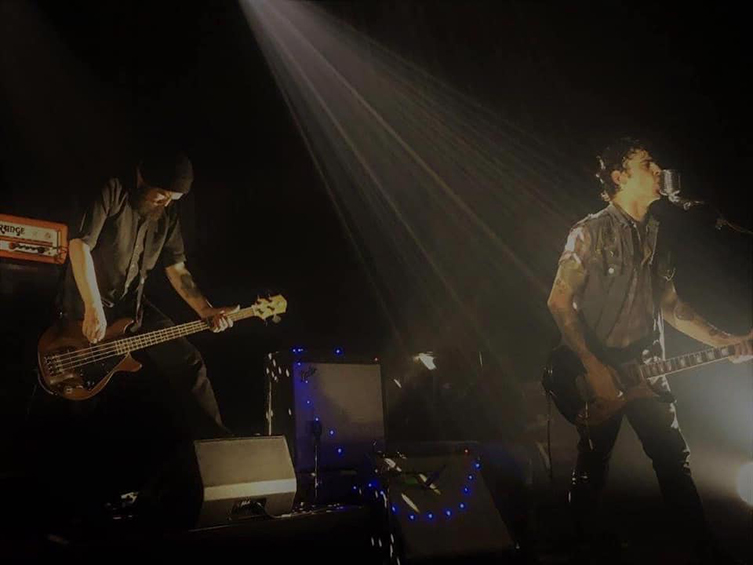
(Photo: Chuck French)
Chuck French Interview
guitarguitar: So, I’m quite familiar with most of Wovenhand’s material. Am I right in saying that this is the first time there’s been such a specific co-writing split between yourself and David Eugene Edwards?
Chuck French: Yeah, definitely. David will usually have, like, 90% of the material musically, and then we just kinda flesh it out in the practice space. Then he’ll do the vocals on top of that. This time around, I did 90% of the music and David did his vocals on top, not in the practice space because of the pandemic but just in my house here. We fleshed it out, slimmed it down and trimmed off parts that didn’t need to be there, stuff like that.
GG: You play with other bands as well. Is the material on Silver Sash stuff that was written specifically for Wovenhand? Did you sit down with David and say, ‘I’m gonna write a bunch of stuff and give it to you’?
CF: Well, he was busy working with Alexander Hacke on the Risha album. I guess I was just like, ‘I have all this fuckin’ music! I wanna go on tour! (laughs) So it was kinda selfish in a way. I was just like, ‘let’s make a record, I have all this music’. I kept sending it to him and sending it to him, and finally he was like, ‘Alright, let’s do it’, you know? And so, we tracked all the drums and everything in the house here, except for his vocals.
GG: So, all the drums are live drums? These days, it can be hard to tell: programmed stuff sounds really convincing.
CF: Yeah, there’s live drums, but they’ve been manipulated and edited, to keep ‘em in time and also to move parts around and stuff. There’s a lot of studio magic in that respect. Some of the songs are definitely all live drums, but some of them are ‘doctored’, like just trimmed up a little bit to fit in nicely.
GG: Just whatever the song requires, right?
CF: Yeah, totally.
GG: Cool! One of the things I wondered about is: going from early Wovenhand to the more recent records like Refractory Obdurate and Star Treatment, there’s a kind of progressively more…’heavy’ is the wrong word, but guitar-intensive, rocky…
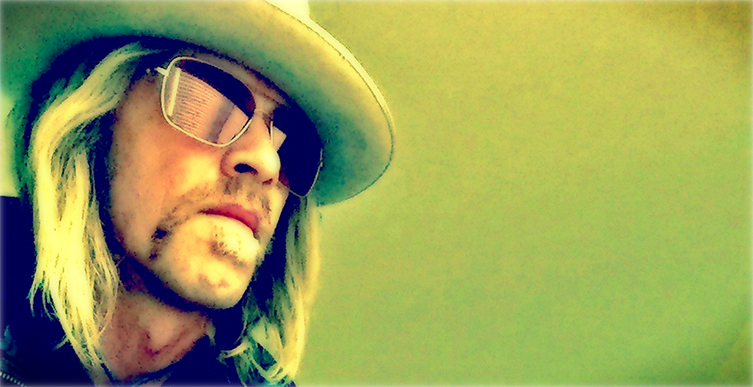
CF: More rocking, yeah.
GG: More rocking, right! And this particular one is perhaps the most rocking of the lot! There’s proper feedback squalls and things like that!
CF: Definitely.
GG: Was that you saying, ‘I really want Wovenhand to sound like this’? Or did the songs just kind of happen that way?
CF: I think it’s more just where I come from, musically. It’s my noisy punk rock background. The thing that turned me on about Wovenhand is that they’re super-intense, but they’re not really heavy. Not heavy like, they don’t have tons of distortion and they’re not like a metal band, but they’re fuckin’ heavy man! First time I saw them play, it was like goddam! I saw this dude (vocalist David) that looked like, I dunno, a Vietnam POW that had just been freed or something, and he was just fuckin’ losing it! It was awesome, I was really turned on, like, ‘Wow, I wanna be a part of that!’ So yeah, the noisy guitar stuff, that’s definitely my influence for sure! (laughs)
GG: Cool, cool. I’ve not yet had the opportunity to see Wovenhand live unfortunately, but is the new record maybe more representative of how you guys sound live anyway?
CF: Umm, well when the Refractory Obdurate record came out, that’s when things got super heavy, as far as things like volume and the amount of distortion on the guitars. Also, when I first joined the band, David always sat down to play on a chair. I was like, ‘You should stand up and rock with us, man. Like, let’s fuckin’ rock this shit’. I think that also brought out some stuff in him, too, in his playing. He’s an amazing guitar player, and with him standing up and rocking, feeling it, I think that kinda like made him turn his shit up a little bit more, you know? (laughs)
GG: Yeah, yeah! It’s such a simple point but it’s such a good point. His perspective of leading the band as it were from a seating position is not as confrontational as standing. And the dude’s already quite intense, from what I can gather from seeing videos! It must then be more so, right?
CF: Yeah, right, totally. No less effective, but a more in-your-face kinda thing. You see this guy walking around, freaking out: it’s pretty intense!
GG: So, you’ve been a part of the band for three records, is that right?
CF: Uh, four records now, I think? Laughing Stock, Refractory Obdurate, Star Treatment and this one. So four records, ten years’ worth of time in the band.
GG: And you were a fan before. How did you actually get involved with being a member?
CF: Well, I have this other band called Get Some and I was friends with Wovenhand’s driver. So, I was always like, ‘You gotta tell David to get Get Some on tour to open for Wovenhand!’ The music is nothing alike at all (laughs). Get Some is more like a hardcore band. I just kept on bugging him and bugging him, till finally they let us go on tour opening for them. It was awesome but we would just clear the room, you know? People would come back in after we’d finished playing! (laughs) We were just so fuckin’ loud! After that, some shit went down, I got fired from my job, then David was like, ‘Hey, I want you to join the band’. That was a wild turn of events, but yeah! That’s kinda how it happened.
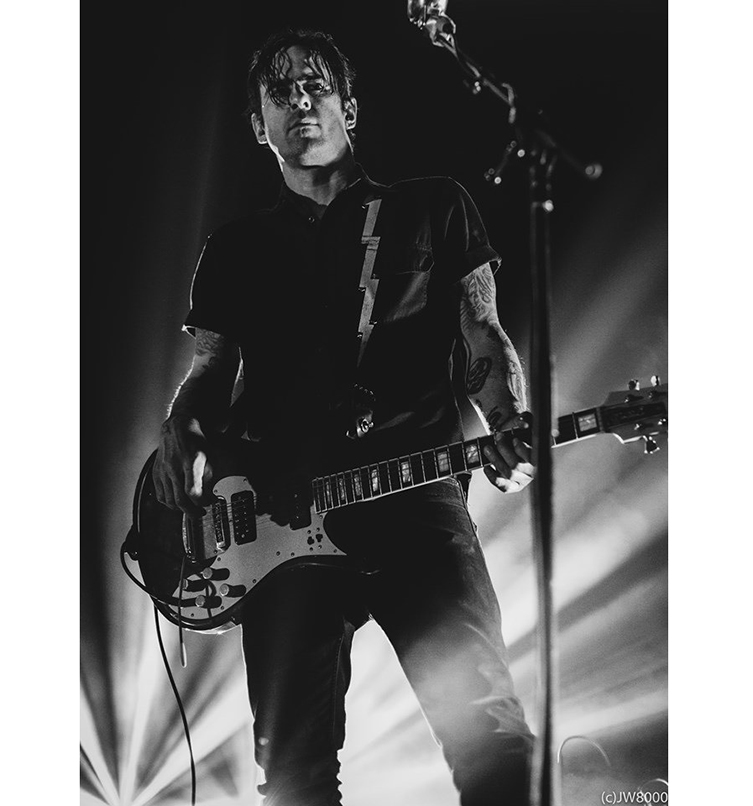
(Photo: Chuck French)
GG: That’s not bad, man! That’s not bad at all! Now, in terms of the co-writing, if we simplify it by saying that most of the new songs started with yourself and then you gave them across to David, do you have input on the lyrics? And do you, for want of a better term, have a say on the lyrics?
CF: Well, for lyrics and any kind of vocal melodies, I leave it to David because he’s got such a good grasp on how he wants it to sound. He’s got a really good ear for how melodies work and structure and stuff like that. I’m just like, ‘Do what you gotta do, cuz I totally trust you man’, you know?
GG: Mm-hmm.
CF: He’s doing a great job. He’s an amazing lyricist and singer, and a great person to work with. He makes me feel like a real musician (laughs).
GG: This co-writing thing is so interesting, especially when you’re at a remove because of covid and so on. Presumably you’d send files across and he’d work on them on his own. Did you ever get any surprises back where you were like, ‘Wait a minute? What have you done with my song?’
"Corsicana Clip is almost ridiculous: all this heavy shit going on, and there's a guy with a wooden banjo, you know?"
CF: Yeah, always! And the songs sound totally different with singing over them. It’s like, wow, this is a totally different song now! Vocals can do that: bring new life to the song where it’s like, ‘I didn’t know this could exist like that’.
GG: That’s so cool. Without focusing too much on David, it sounds like he doubles his lead vocal tracks. Is that correct?
CF: Yeah, he does. He’ll do a lot of backup vocals too, to accentuate parts and bring out things that he thinks should be there. He does do a lot of doubling and he uses that effect very effectively to enhance his lines, he’s really good at it.
GG: Awesome! For me, Wovenhand’s music is very visual. To my British ears, there’s a lot of ‘America’ in Wovenhand’s sound. Even the fact of David’s cowboy hat, and the kind of frontier vibe and Native American stuff that David’s interested in: all of that helps me visualise big open dark skies, grand canyon, all that great imagery. When you’re writing your pieces of music - for Wovenhand or other bands - I wonder: do you see the music in visual terms? And if so, how does Wovenhand’s music look to you?
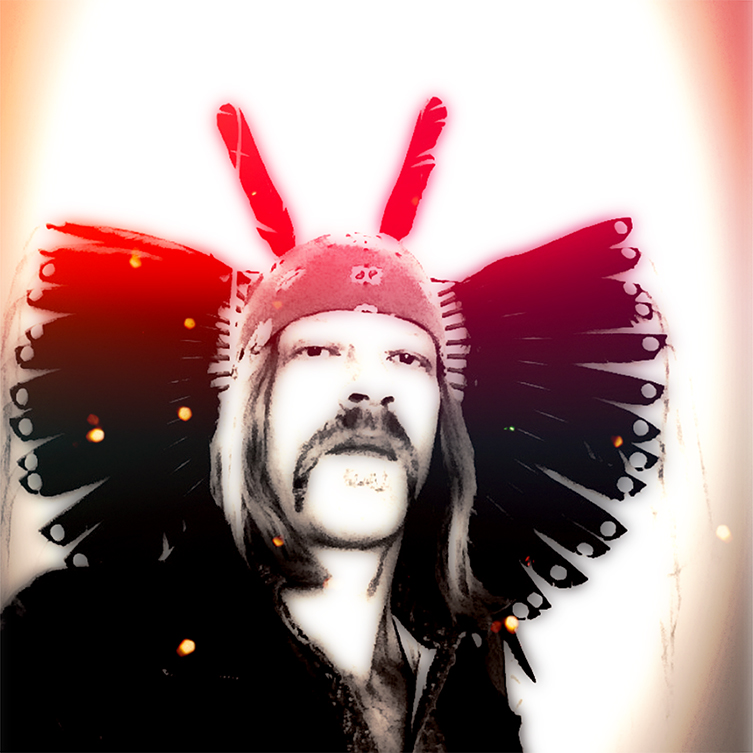
CF: Sometimes, well, definitely, you're in the desert for sure. It’s like you’re stuck out there, what are you gonna do? It’s kinda scary and yeah, it can happen like that, totally, for sure. This picture comes into your head and I can see David, hear him singing. Or, a piece of music will present itself and it’s like, ‘this definitely is something David’s gonna dig’, you know? And sometimes I’ll have shit like that and he’ll be like, ‘Nah man, I’m not into it’. (laughs) But yeah, it’s always about throwing shit at the wall, and some of it’s gonna stick.
GG: Got you! As a musician, generally - just before we get into the gear and guitars and stuff - the pandemic has obviously affected us all, and that of course determined how Silver Sash came to be. Zooming out from that, how has the pandemic affected Wovenhand and you as a musician?
CF: It’s fuckin’ intense, man! It sucks! I haven’t played any shows since 2019. It’s really hard, man. It’s depressing: I haven’t even had any time to get into a practice space with my bands and so it’s been hard, man. Luckily I have my family here to be around and they’re awesome, I love them so much but yeah, it sucks! I really want to just load up the van with my equipment, you know? Just loading in, it’s like the exercise I get every day! Not doing it takes a toll on you. I’m not doing anything, man!
"That, to me, is the most exciting thing about the music: the ability to just get lost in the song right away. You're gone, you're somewhere else."
GG: Totally! And loading the van with your gear, it’s one of those things that five years ago would’ve been a chore but now it’s quite a joyful thing, to fire the amp in the back and go, ‘Oh yeah, I’m doing it again!’
CF: Seriously, yeah. I know, I think about just driving my car out back, loading my shit in, driving around town and coming back every day, just to get the exercise! (laughs)
GG: That was a great show! Haha!
CF: Instead of going to the gym, just load the van and unload it.
GG: Yeah, you can move on from the Marshalls up to the Ampegs once you’re feeling strong again!
CF: Yeah, totally.
GG: Well, talking about gear then, Silver Sash is sonically really exciting to listen to. Obviously, your primary instrument is guitars, so let’s talk guitars! I’ve seen some photos and videos of Wovenhand playing live and you have some quite unusual looking guitars, one of which I can’t even recognise, and I work for a guitar company! What are you playing?
CF: Mostly I was playing a God City Instruments guitar that Kurt Ballou designed. It’s kinda like a cross between a Mosrite and some kinda weird Japanese guitar. It’s fuckin’ cool! It’s got a TV Jones pickup in it. David scored a 60s Mosrite copy in Bakersfield, California. It’s called a Morales and it’s super cool man, the pickups are so nice.
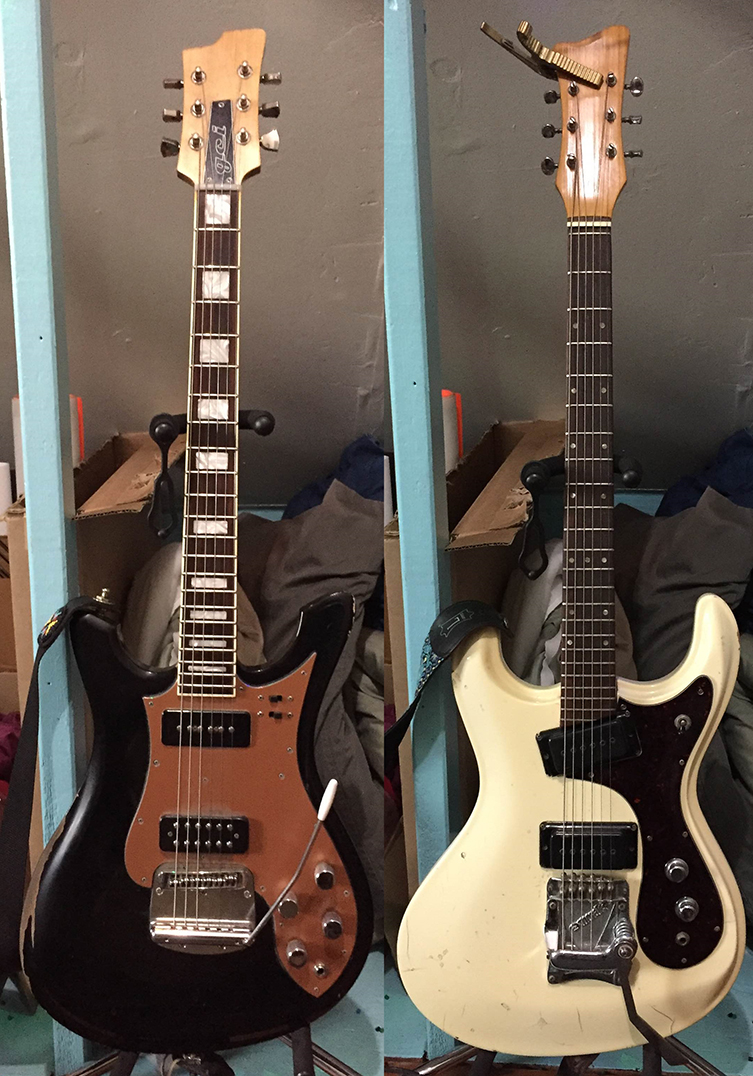
(Photo: Chuck French)
GG: Ah, is that his main white Mosrite-looking guitar?
CF: Yeah, that’s it.
GG: And your God City Instruments guitar, is that the main one you used for Silver Sash?
CF: Yeah, that and I have a ‘69 Dan Armstrong that I use a lot on recordings. It’s an awesome guitar man, so cool.
GG: Yeah, totally! It’s quite nice for me when it’s not just another Les Paul, Strat or Telecaster, you know? I appreciate these unusual instruments! And for string gauge, what do you prefer?
CF: I usually use elevens but I’ve been getting a heavier D-string lately, bumping it up to a .032 instead of like a .028, just because that’s the string I always break! It’s so weird. I just kinda did it because of the live shows, you know? I always break the D-string and I don’t kow why the fuck that is.
GG: Wow! Even just using elevens, that’s relatively heavy these days! What’s your main tuning? I know there’s various tunings with Wovenhand, but what are you normally in?
CF: I tune to drop D normally, and live I’ll use one of those Digitech Drop pedals to lower my tuning. David, he’ll switch from that white Morales guitar which is in a D minor weird open tuning, to the Gretsch, which is in a C tuning, though it’s weird, like there’s a lot of the same notes, you know?
GG: Yeah!
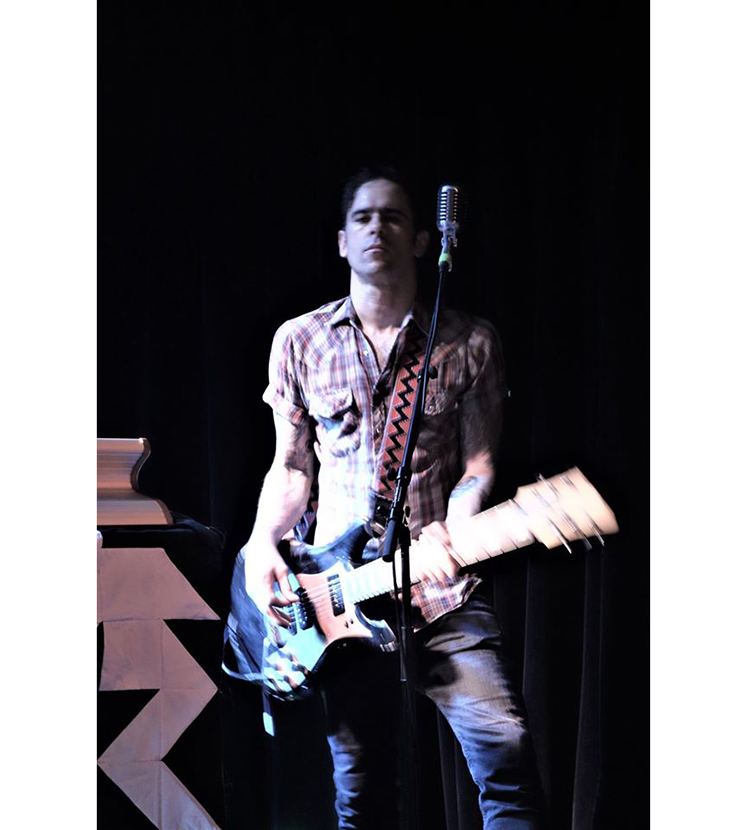
(Photo: Chuck French)
CF: And so he gets that really cool droning sound. Yeah, I used to switch guitars all the time but it’s like, ‘Don’t just start a song before I’m ready, dude! Hold on!’ So the Drop pedal totally helps me.
GG: Good shout! It’s quite unusual when you find a band who use two different tunings on the same song at the same time. You can’t just look across at his hands because he’ll be doing something completely different.
CF: Yeah, it’s weird: I can’t just sit there and watch him play: I’ll figure it out on guitar but his tunings are so weird. And the strings he uses on his guitars are like…the C tuning he plays, the bottom string is like a .070 or something like that! Fuckin’ crazy! (laughs)
GG: Wow, that’s ridiculous, haha! What about picks? What do you prefer for a pick?
CF: I use the orange Tortex ones right now, the Dunlop ones.
GG: Ah, a .60mm.
CF: Yeah, I think it’s 60.
"Even for bands that no one has heard of, touring in Europe is amazing because you get fed, you get a place to sleep and you get, you know, a soundcheck!"
GG: That’s quite a thing I’ve noticed with guitarists: it seems to be the heavier the strings, the lighter the pick, because that’s a relatively light pick and you use relatively heavy strings. Do you like the more kind of percussive feel?
CF: Yeah, my right hand is all over the place. With my other bands, I was actually using a thinner pick, a 50. I would just grind my fingertips away on my strings (laughs) so I’m trying to break that habit because my fingers are just fucked right now! But yeah, I like to be able to get bigger sounds too, so thicker picks is something I’ve been experimenting with.
GG: Cool! And what are you plugging your wonderful God City Instruments guitar into?
CF: I have a Fender Twin that I use, that’s my main amp. It’s a ‘65. It’s a funny story: when I was living in Chicago in the early two thousands, my friend found it in the trash, in an alley in Chicago. He brought it home and I was like, ‘Holy shit! Look at this amp!’ I didn’t know anything about Fender amps at this time, and I’m like, ‘This thing’s fuckin’ huge!’
So, I brought it to the local repair shop and as I was walking in, somebody was like, ‘I’ll give you two thousand dollars for that right now! (laughs) I was like, ‘Ahhhh, no, I’m gonna keep it.’ I spoke to the guy in the shop, like, ‘I’ve got this amp: can you make it awesome? I dunno what’s wrong with it’. It was covered in grease and a lot of the knobs were broken off. There was a hole in the cloth, but it turned on and it worked! It still had the original plug on it.
He was looking at it and saying, ‘Wow, this is great!’ I told him my roommate found it last night and he was freaking out, like ‘Are you fuckin’ kidding me?’ It’s a 1965 and all-original. What a score, dude. And I still have it! It’s amazing.
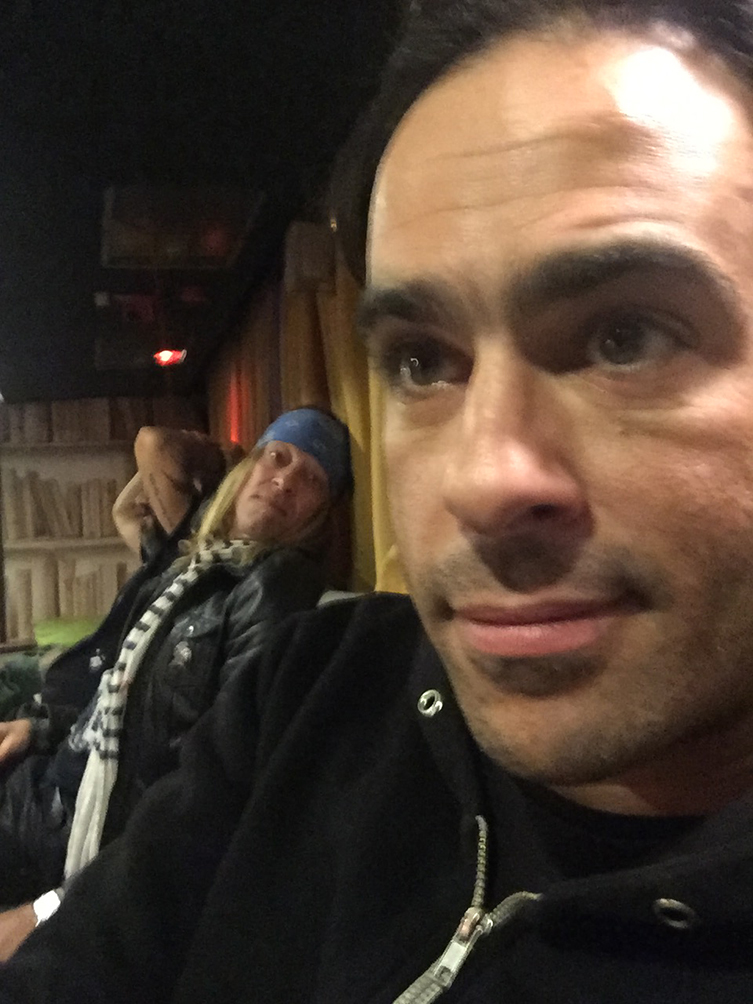
(Photo: Chuck French)
GG: Wow! Good find! I’m not so clever on my Fender amps, is that a blackface model?
CF: It’s a Blackface Twin. It’s fuckin’ loud, I can’t put it past three, it’s just… we’ve had shows with my other band where all the other bands have full Marshall stacks and I have this Fender Twin. The cops come to the show and we get the cops called on us, you know? (laughs) It’s loud.
GG: Twins are the loudest amps ever. I guess they are as efficient with power as they are loud to begin with, haha! Same with an AC30; they just blast bigger stacks away! I’ve never been able to understand it.
CF: I’ve never been able to understand it either, man! There’s only two speakers, doesn’t that make a difference? I dunno. And you can’t get it to break up: you can turn that thing right up and it just stays clean as a bell.
GG: But of course, your sound with Wovenhand is nothing like clean, so what are you using for overdrive?
CF: Mainly an old 80s Rat pedal. I recently got turned onto that 1981 drive. It’s like a Rat, not a clone but sonically based on the Rat pedal. The Rat is my favourite distortion. You can turn your guitar down and it cleans up really nice. I just love that sound, it’s like a classic rock sound but you can get these other awesome sounds, punk rock and stuff. The Rat pedal is mainly the source.
GG: Okay, and do you use volume control to take the edge of your gain then, yeah?
CF: Yeah, totally. Either with the knob or with a volume pedal. Gotta have a volume pedal, definitely.
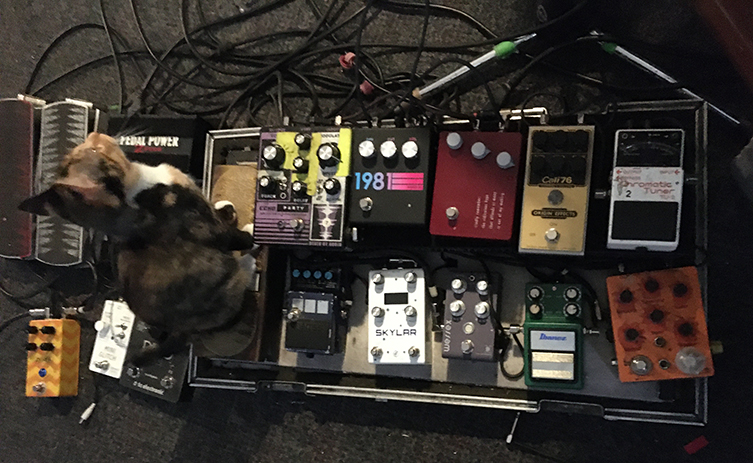
(Photo: Chuck French)
GG: What else have you got, pedal-wise?
CF: I have a delay pedal, like a Death By Audio Echo Dream II, that thing is such a cool pedal. Then the Digitech Drop is really good for the live shows. I recently got into using a compressor and I got one of those…what’s it called? It’s like a compact…can’t remember the name of it right now but it’s awesome! And I have an old tremolo pedal that this company called 4MS made. They mainly do Eurorack synthesizer stuff now, but for a while in the late 90s they were based out of St Louis and they were making all of these crazy noise pedals. I got a cool tremolo pedal from them. That’s kinda like the core of it. I always have a reverb pedal, of course.
GG: Cool, nice set up! Now, this is going back to an earlier subject for us. I should’ve asked this already but I just thought of it there! See that Wovenhand tune Corsicana Clip? Presumably David wrote that song to begin with?
CF: Yeah.
GG: Half way through that song, it stops and abruptly changes, and it’s totally thrilling! How did that end up happening? Was that part in there already when David wrote it?
CF: That happened in the practice space. David had the song written up to there and then we were like, ‘Let’s make this thing fuckin’ heaby, man!’ This weird-ass, I don;t even know how to describe that kinda sound, this throbbing, driving, trance-like thing, and David’s playing this banjo on top. It's almost ridiculous: all this heavy shit going on, and there’s this guy with a wooden banjo, you know? Playing that song live is super fun and David gets really lost in that shit. That’s what, to me, is the most exciting thing about that music: the ability to just get lost in the song right away. You’re gone, you’re somewhere else.
GG: Yeah, completely! That’s something I wanted to touch on actually, and I hope I don’t use the wrong language to describe it. As a listener, it’s almost like there’s a meditative or a hypnotic situation with a lot of the music, and I wondered if that was a deliberate thing. Is that something you guys do on purpose?
"It's a funny story: my friends found a '65 Twin in the trash, in an alley in Chicago!"
CF: Yeah, I think that’s just something that happens naturally. With David, it’s just like, you know, once he starts playing, he’s not there anymore. He’s in the song. For me, I wanna be there too, man! Cuz that’s like, you know, you get to this place where nothing is going on, what’s going on in your head and what’s happening with the music: the sound kinda takes over. That’s the shit that turns me on, that’s what I’m most attracted to.
GG: Yeah, totally! Do you think that’s something - I mean, I’m not speaking for anybody else - but do you think that’s what happens for the audience as well? And that’s why Wovenhand gigs are intense?
CF: Yeah, definitely. Yep. He goes to a place, you know? He’s already a pretty interesting looking person, and when he starts playing music, his eyes start rolling back into his head. It’s like, ‘Woah!’ He’s fuckin going somewhere!
GG: Yeah! And when you realise that the performer is taking part in their own personal ‘thing’, that makes it so much more valuable as an audience member.
CF: Yeah, I mean, you can’t fake that. It has to be real or I think everybody would know pretty quick that it’s not.
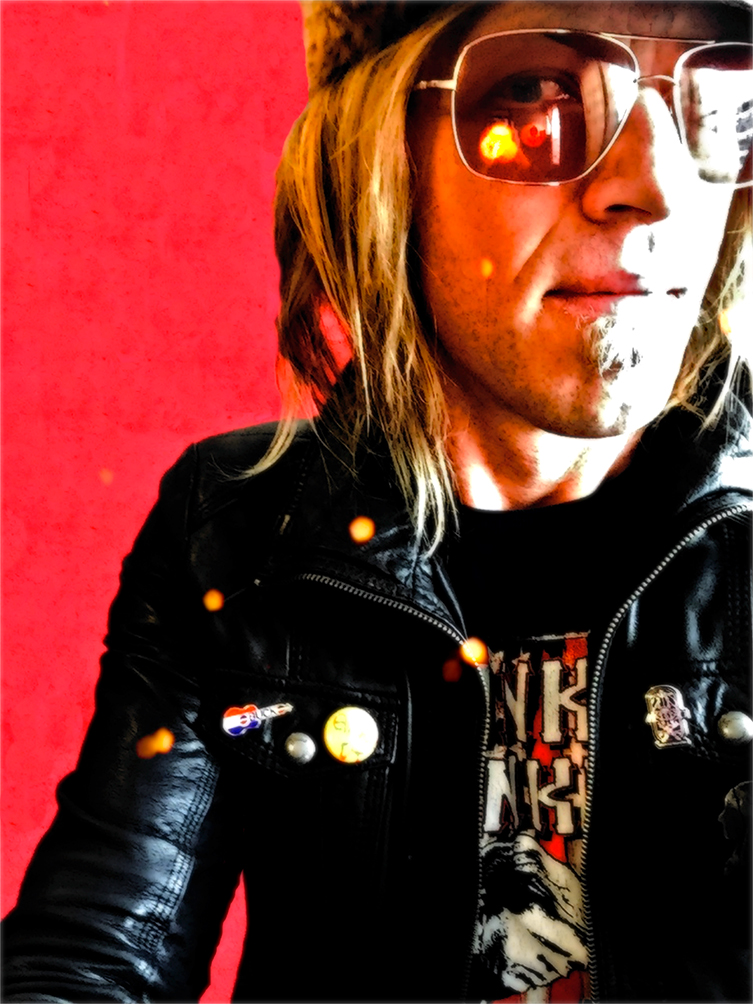
GG: Totally. So, we just spoke about, for want of a better expression, the ‘guided intensity’ of a live Wovenhand show. I wondered: one of the things that I think is really special about a band such as Wovenhand is that there is a real sense of energy to the recordings. I know that you didn’t all record it together, but Silver Sash sounds like a bunch of dudes in a room playing. It’s got that real live energy and atmosphere to it. Is it difficult to retain that?
CF: Uh, I guess, yeah. The thing about it though, is that we recorded it all at my house, so there no sense of, ‘fuck, we’ve wasted a hundred dollars every 15 minutes’, you know? So we could just wake up, have a cup of tea, go back there, have a smoke and take our time with it. Especially since we don’t have a deadline. It’s comfortable, you don’t have to worry about going to a different city to record. Which can be fun! The last record we recorded in Chicago at Electrical Audio, which is like one of the dream places to go record. So it’s cool to be able to do it at home, where you can just take your time. I don’t have to get dressed if I don’t want to! (laughs) Go back there and record some stupid noise if you’re feeling it. That definitely has a lot to do with the feel of it.
GG: Okay, and is it easy to also sound flat and lifeless if you don’t get the right take? Like, does it take work to preserve a certain sonic character?
CF: Yeah, I hear what you’re saying. Sometimes, we have to work at songs to make ‘em, like, the way that they’re gonna be. I think, for this record, it was happenstance: putting one thing on top of another, on top of another, sorting our way through it, finding the right way to go. These songs just kinda came to the surface and that’s how they were. At some point we were like, ‘Alright, we’re done fucking with these now, let’s mix’, you know? Boom.
"All the other bands at the show have Marshall stacks and I have this Fender Twin, and we get the cops called on us, you know?!"
GG: Yeah, totally. And I wonder, when recording in your home, some of the coolest sounds on this album are just crazy feedback noises. Have you got neighbours close by? Is that ever a problem?
CF: No, I actually don’t have neighbours close by. I have one neighbour over here but he’s also a musician. Otherwise we’re kinda surrounded by a weird industrial/residential area. There’s a lot of junkies in this neighbourhood and a lot of alcoholics, so it’s kind of like a weird corner of Denver that’s not totally gentrified and uh…people don’t give a shit (laughs). We practice back here so, usually neighbours are like, ‘Oh, I love your band! Come and play at the bar down the street!’ (laughs)
GG: That’s definitely better!
CF: It’s good to be able to make as much noise as you want, for sure. I gotta do that shit.
GG: Yeah man, that’s important! So, I suppose that leads me onto the feedback noises: that will just be you turning your amp up super loud and making feedback, right?
CF: Yeah, I mean, sometimes with pedals you can get moderate volume levels and still achieve feedback, which is pretty helpful but generally yeah, you gotta be fuckin’ loud to get the good shit!
GG: Exactly! And there’s also some nice electronic elements too. They were creeping in on the last record but I hear them more obviously now. Is that yourself?
CF: Mostly it’s stuff that I brought. David had gotten a Moog Sub 37 and he left it over here. We did a lot of stuff with that. We programmed drums with FL Studio. A lot of weird sounds that I collected with my handheld recorder over the years, that definitely had a huge part in this album for sure.
GG: Ah, that’s interesting! Is it FL Studio you use to record with?
CF: No I use Reaper, actually.
GG: Okay, so withthose field recordings, would you just, like, email yourself and stick the files into Reaper and then go nuts with effects and stuff?
CF: Yeah, totally. Just drop it in, cut it up and fuck with it. One song has a drum loop that starts and there’s some radio squawking. We were in a Serbian taxi and they were talking back and forth. I was like, ‘Man, that’s fuckin’ cool!’ and recorded it. And the drums on that song, 8 of 9, were recorded in this venue in Germany, this cool empty shell of an old theatre. The drums just boomed, they kinda reminded me of Lord of the Rings or something!
GG: That’s wicked man! So inspiring, and the context of that sound changes everything: it’s not just a sample library.
CF: Yeah, totally.
GG: Now, here’s something I’d normally ask right at the beginning: who were your musical influences as you were coming through?
CF: Well, of course Jimi Hendrix and classic rock, Led Zeppelin. My mom was quite young when she had me so I grew up listening to all kinds of early 70s rock music. I got into Jane’s Addiction in the early 90s…
GG: Aw yes, I love them!
CF: Nothing’s Shocking and Ritual De Lo Habitual really taught me a lot about guitar because I just had to sit down and play along with them. I learned so much about guitar with those two records! But yeah, early punk rock, coming up in the 80s, listening to punk rock bands, skateboarding, Jane’s Addiction, the Crucifucks, Sonic Youth. Shit like that was just huge, I just love all that noise and feedback stuff. Awesome.
GG: I’m loving it, especially Jane’s Addiction. I don’t think they get enough love and they were game changers, you know?
CF: Yeah, definitely man.
GG: So, in every Wovenhand interview I read online, they always comment about how you guys are bigger in Europe than you are at home in the States. I don’t know if that’s much of a statement, but what’s true is that, like most bands, you’ve not been touring for a couple of years. Obviously, you do have a big audience over on this side of the Atlantic, so are there tentative plans to tour Silver Sash over this way?
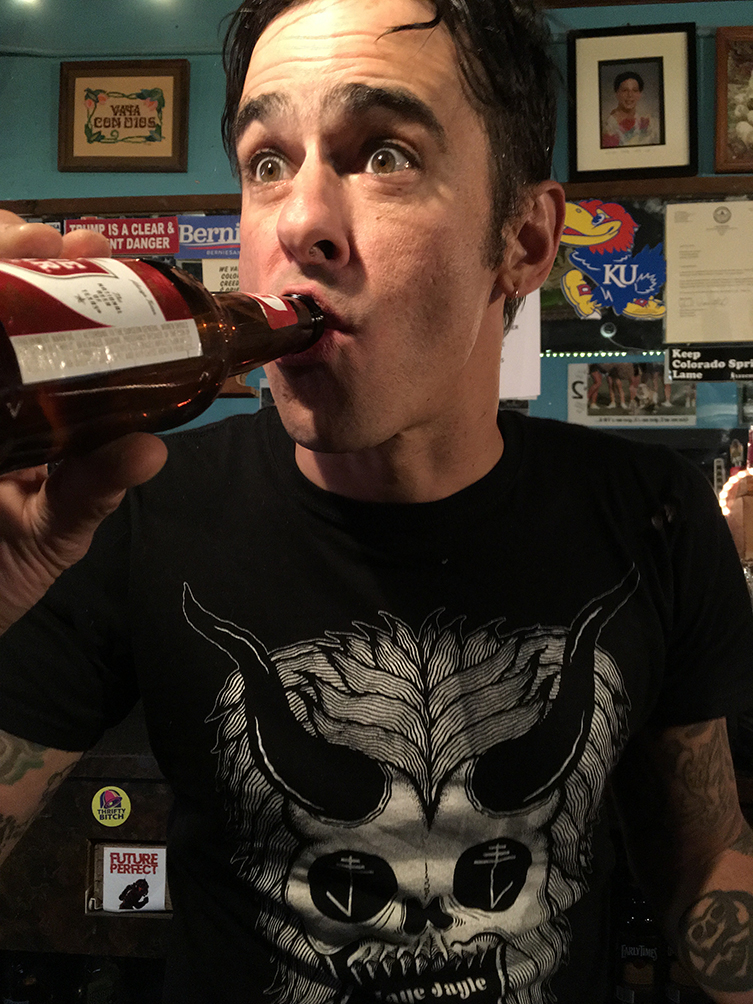
(Photo: Chuck French)
CF: I hope so! I haven’t heard anything yet. I’m not sure if David’s gonna do some more solo touring or what he wants to do, but it would be great to be in Europe again. We do do a lot better there than here. I think people in general give more of a shit about music, especially live music over there. People love live shows here but the infrastructure is lacking as far as taking care of the artists, unless you’re at a huge level. But even for bands that noone has heard of, touring in Europe is amazing because you get fed, and you get a place to sleep and you get, you know, a soundcheck! From people that care! It’s quite a contrast!
Chuck and I chatted a little more about the relative merits of European touring, being put in with metal bands and another great quote arose: ‘You don’t need distortion to be heavy’.
What an inspiring conversation from a musician who is being creative right out there in the trenches. There really isn’t a band out there quite like Wovenhand. Their vibe is intoxicating and there’s depth for days. In today’s climate, there’s lots to explore. Silver Sash is out now on Glitterhouse records and is a superb listen. Keep up with the band via the official Wovenhand website.
We’d like to thank Chuck for giving up his Friday morning to talk to us. We’d also like to thank Jan Korbach for setting us up with Chuck. As ever, thank you for taking five from an endlessly busy life to read this article and share the story with us! We appreciate it, and have well over a hundred more in our guitarguitar interviews section if you’re looking for more! Click through to find interviews with Nine Inch Nails, Peter Hook, Steven Wilson, Mr Bungle, Lord Huron and many more!


